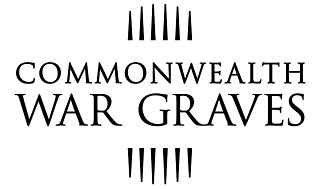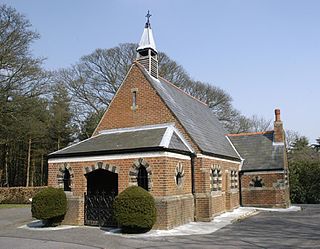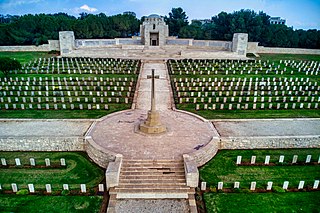
The Commonwealth War Graves Commission (CWGC) is an intergovernmental organisation of six independent member states whose principal function is to mark, record and maintain the graves and places of commemoration of Commonwealth of Nations military service members who died in the two World Wars. The commission is also responsible for commemorating Commonwealth civilians who died as a result of enemy action during the Second World War. The commission was founded by Sir Fabian Ware and constituted through Royal Charter in 1917 as the Imperial War Graves Commission. The change to the present name took place in 1960.

Brookwood Cemetery, also known as the London Necropolis, is a burial ground in Brookwood, Surrey, England. It is the largest cemetery in the United Kingdom and one of the largest in Europe. The cemetery is listed a Grade I site in the Register of Historic Parks and Gardens.

A war grave is a burial place for members of the armed forces or civilians who died during military campaigns or operations.

Sai Wan War Cemetery is a military cemetery located in Chai Wan, Hong Kong which was built in 1946. The cemetery was created to commemorate soldiers of Hong Kong Garrison who perished during the Second World War. The cemetery also contains 12 World War I burials. A total of 1,528 soldiers, mainly from the Commonwealth, are commemorated here. Most of the remaining burials are located at the Stanley Military Cemetery.

Duhallow ADSCemetery is a Commonwealth War Graves Commission burial ground for the dead of the First World War located near Ypres on the Western Front in Belgium.

Aldershot Military Cemetery is a burial ground for military personnel, or ex-military personnel and their families, located in Aldershot Military Town, Hampshire.

The Voormezeele Enclosures are Commonwealth War Graves Commission (CWGC) burial grounds for the dead of the First World War located in the Ypres Salient on the Western Front.

Brandhoek New Military Cemetery is a Commonwealth War Graves Commission burial ground for the dead of the First World War located near Ypres in Belgium on the Western Front.

The Cassino War Cemetery is a war grave cemetery in the commune of Cassino, Province of Frosinone, 139 kilometres (86 mi) south-east of Rome, Italy.

Hamilton Road Cemetery is a combined municipal and military burial ground situated in the coastal town of Deal, Kent, in South East England. Opened in May 1856, it was created to provide a new burial ground for Deal at a time when its general population was expanding and when previous, often ad hoc facilities for dealing with deaths in the area no longer sufficed.

Grangegorman Military Cemetery is a British military cemetery in Dublin, Ireland, located on Blackhorse Avenue, parallel to the Navan Road and beside the Phoenix Park.

The Jerusalem War Cemetery is a British cemetery in Jerusalem for fallen servicemen of the British Commonwealth in the World War I in the Palestine campaign.

The Arras Flying Services Memorial Commonwealth War Graves Commission war memorial in the Faubourg d'Amiens Cemetery, Arras, France. The memorial commemorates nearly 1,000 airmen from forces of the Commonwealth who were killed on the Western Front during World War I and who have no known grave. The memorial was designed by Edwin Lutyens, sculpted by William Reid Dick and unveiled by Hugh Trenchard, 1st Viscount Trenchard, Marshal of the Royal Air Force on 31 July 1932.

Mortlake Cemetery is a cemetery in Kew in the London Borough of Richmond upon Thames. It is also known as Hammersmith New Cemetery as it provided burials for the then Metropolitan Borough of Hammersmith when Margravine Cemetery was full. The cemetery opened in 1926 and is still in use. It is now managed by Hammersmith and Fulham Council.

Hollybrook Cemetery is a cemetery in Bassett, Southampton, England containing around 53,000 graves as of August 2012 and still open to new burials as of March 2016. It is one of the main cemeteries in Southampton.
Pembroke Military Cemetery Malta is a burial ground for military personnel and their dependants. It is located close by the former St Patrick's Barracks in the Pembroke Council area, on a minor road.

Ta' Braxia Cemetery is a cemetery in Gwardamanġa, located near the boundary between Pietà and Ħamrun, Malta. It was built between 1855 and 1857 as a multi-denomination burial ground primarily intended for British servicemen, partially replacing a number of earlier 18th century cemeteries. The site also incorporates a Jewish cemetery which was established in around 1830. The cemetery's construction was controversial since the local ecclesiastical authorities were opposed to a multi-faith extra-mural cemetery.

The Imtarfa Military Cemetery is a cemetery in Mtarfa on Triq Buqana in the Northern Region of Malta. The cemetery contains over 1,400 interments and commemorations including 254 graves of military personnel killed in the country in World War I and World War II. Many graves are marked by Commonwealth War Graves Commission (CWGC) gravestones. Some of the CWGC graves are damaged due to bombing of a nearby airfield in the Second World War.

The Acheux British Cemetery is a World War I military cemetery located in the French Commune of Acheux-en-Amiénois in the Somme Region.

The Cerisy-Gailly Military Cemetery is a military cemetery located in the Somme region of France commemorating British and Commonwealth soldiers who fought in World War I. The cemetery contains mainly those who died on the front line near the village of Cerisy between February 1917 and March 1918 and during the Allied recapture of the village in August 1918.



















